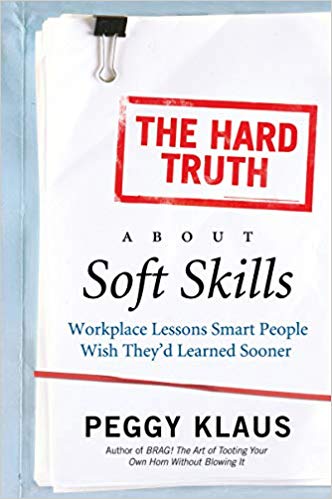Book Report: The Hard Truth About Soft Skills
By Peggy Klaus, 2007, 173 pages
Review by Mark Kaczmarek
The first time I heard about soft skills was about ten years ago at an INCOSE dinner. The speaker was talking about what was needed to be a good leader and manager. His suggestion was to study liberal arts in order to be successful at these positions. Whoa! What did he just say? I could not believe my ears.
Fast forward to this past April at the Chapter dinner meeting with speaker, Teresa Armstrong, who covered the topic about soft skills for engineers. The video of this event can be found on the Chapter website. I also took the tutorial taught by the speaker the following Saturday. This book was included as part of the materials for the tutorial.
Now, what was brought up at the dinner and the tutorial was the fact that soft skills are difficult for most in the engineering ranks. We are taught to have our facts correct and be ready with reams of supporting data to present our design or trade study. I think that most people reading this review would agree with that statement. However, even with the best technical preparation, the lack of soft skills can sink you. The book points out that, “These so-called soft skills complement the hard ones, and are essential for success in the rough-and-tumble work place. You can have all the technical expertise in the world, but if you can’t sell your ideas, get along with others, or turn your work in on time, you’ll be going nowhere fast.” The purpose of this book is to have one review and examine the items presented for themselves in order to enhance areas we need to enhance our soft skills.
The author asks the question, “Why is it so important that you take the reins when it comes to career management?”
First, gone are the days of job security.
Second, people across the board are being asked to juggle more and more assignments, often combining the responsibilities of two or three people into one job.
Third, those who let their careers “just happen” or expect employers to orchestrate them, will end up disappointed.
So, knowing yourself is as important as knowing how to do the job.
The book covers a wide gamut of areas in eight chapters, and it was a reasonably easy read. The hard part was looking at oneself in the mirror to ask what areas need enhancing and to be honest with one’s self to seek change. This was covered at the dinner and in the tutorial as well. Each person will get what they need for their situation. The book has many examples, stories, and “how to” to gain better perspective and solutions. The reader is not left guessing as to what to do next.
Overall, the dinner presentation, tutorial, and this book are well worth the time and effort. A final word of advice from the book is this, “Continuing to learn and improve yourself isn’t just good advice for managers. It’s good advice for everyone. No matter where you are in your career, you’re always a work in progress.”
The fact that you are reading this review is an example of my soft skills.

